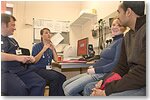Ante-natal Care
 As soon as you know you are pregnant you should get in touch with a midwife or your GP to organise your antenatal care. Your midwife will also tell you about local antenatal classes, which will put you in touch with other women and prepare you for becoming a mum.
As soon as you know you are pregnant you should get in touch with a midwife or your GP to organise your antenatal care. Your midwife will also tell you about local antenatal classes, which will put you in touch with other women and prepare you for becoming a mum.
Your First Antenatal Visit
 At your first antenatal meeting with your community midwife you will be asked about your health, any illnesses and operations you have had, and about any previous pregnancies or miscarriages. You will be asked about your and your baby’s father’s family history (e.g. whether there are twins on your side or any inherited illness) and yours and your baby’s father’s family origins. This is because certain inherited conditions are more common depending on family origin. Screening for these, if necessary, should be offered by the time you are 10 weeks pregnant.
At your first antenatal meeting with your community midwife you will be asked about your health, any illnesses and operations you have had, and about any previous pregnancies or miscarriages. You will be asked about your and your baby’s father’s family history (e.g. whether there are twins on your side or any inherited illness) and yours and your baby’s father’s family origins. This is because certain inherited conditions are more common depending on family origin. Screening for these, if necessary, should be offered by the time you are 10 weeks pregnant.
You may also be asked questions about your work or the baby's father's work and where you live, to see if there is anything about your circumstances that might affect your pregnancy. All this information will help to build up a picture of you and your pregnancy so that any special risks can be spotted and support provided.
The maternity team will want to know the date of the first day of your last period, to help work out when your baby is due. You will probably want to ask a lot of questions. It often helps to write down what you want to say in advance, as it’s easy to forget once you are there. It’s important to find out what you want to know and to express your own feelings and preferences.
You will probably be asked about any previous mental health problems and given an opportunity to raise any other concerns you may have. At the first visit you will also be given a lot of choices for antenatal care and birth and information on the screening tests you may be offered.
Your Health
 Staying healthy during pregnancy is very important – for both you and your baby.
Staying healthy during pregnancy is very important – for both you and your baby.
You should eat a variety of different foods, but you do need to be careful with certain foods as they could harm your baby.
The NHS Choices website has a huge range of helpful tips and advice on how to stay healthy during pregnancy.
Please visit their site: NHS Choices - Your health during pregnancy